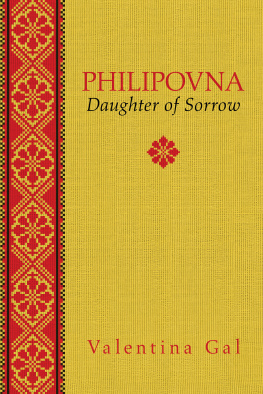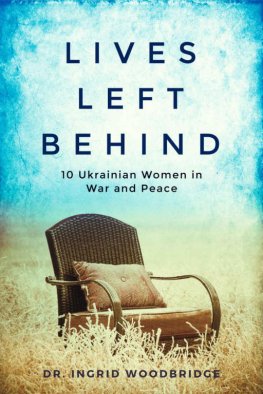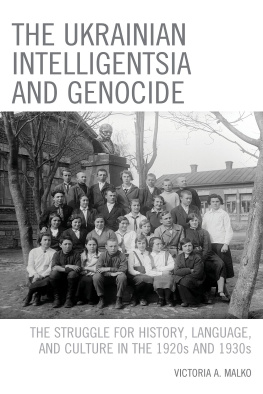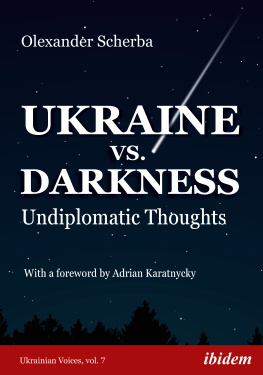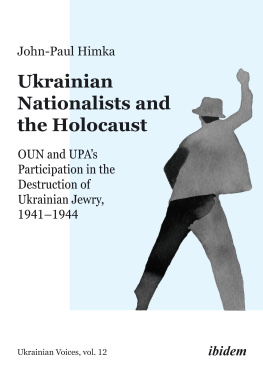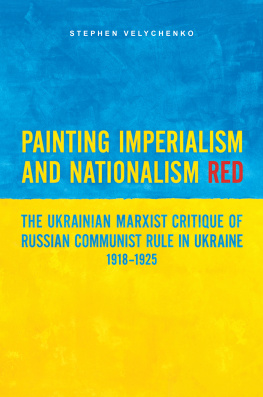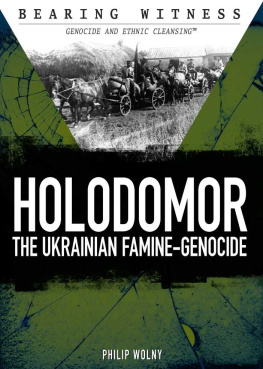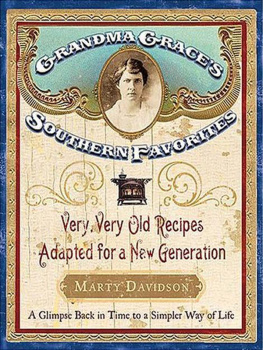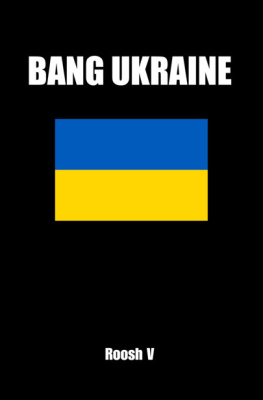Character List
Vera Philipovna: daughter of Philip and Barbara Kyslenko
Godfather: Philipovnas uncle and godfather, name otherwise unknown
Vera Xenkovna: cousin and oldest daughter of Uncle Misha and Auntie Xena
Dmytro/Mitya: Philipovnas distant cousin and best friend
The Unravelled One: Mityas mother
Auntie Xena: Philipovnas aunt
Uncle Misha: Auntie Xenas husband
Michael, Alexander, Viktor, Maria and Marta: the rest of Misha and Xenas children.
Taras: Xenkovnas young man
Auntie Lena: Philipovnas aunt
Uncle George: Lenas husband
Auntie Liza: Philipovnas aunt
Comrade Zabluda: Communist Party Boss, head authority in village
Comrade Asimov: school teacher and Communist Party enforcer
Uncle Paulo: older neighbour and friend of Uncle Misha
Uncle Simon: more distant neighbour and friend of Uncle Misha
Uncle Ivan: acquaintance of Uncle Misha and Party member
Dr. Bondarenko: doctor from out of town
Slavko: doctors servant
Comrade Svetlana Ivanovna: Communist head of the orphanage and childrens doctor.
Comrade Marina Nikolaiovna: orphanage worker and doctors helper
Gregory: Marina Nikolaiovnas nephew and helper
Katerina: neighbour
Auntie Anna: neighbour and close friend
The Legacy
I STAYED AWAY from other children. I preferred my own games of picking flowers and long processions that ended with me and the rag doll Mama made sitting on my parents grave and talking to them. I cant remember any of the funerals or what my Mamas face looked like. But I still hear the memory of her singing a lullaby. Though Mama was gone, I could always feel her close to me.
My Godfather, who was also my fathers brother, took me to his house after all of the ceremonies were over. They say that every time the door opened, I ran straight back to my parents cottage. They would find me holding my fathers tools, spinning the wheel of my mothers sewing machine or curled up on their feather bed by the hearth. If it was a nice day, I hid in our garden, finding bugs or leaves or stray flowers that struggled up through the untended mass of vegetation.
One day, a group of strangers approached my fathers house as I was playing with some twigs and a cocoon in the empty garden. I was frightened at first but I recognized my Godfather and Auntie Xena so I didnt run away.
Verochka, there you are. Come and say good-morning to your Aunts and Uncles, Godfather called to me. Auntie Xena has brought you a sweet.
I studied the group cautiously. Strangers did not come here unless something very important was happening. What could be so important that a whole group of people was visiting me? My parents were dead and couldnt invite them in.
Godfather drew me forward and, there beneath the frosty blue of the autumn sky, I first set my eyes on my fathers sisters. They were robust women with rosy cheeks and bushy eyebrows. Beneath their embroidered platoks, their heavy brown hair was plaited in braids that were fashioned into buns on their heads and their sharp eyes looked right through me. They were not like my mothers sister, Auntie Xena, at all. I loved her smile and those soft hazel eyes that wrapped you in a warm blanket of welcome.
Come, Child, she said. Let me give you a big hug. She kissed me on both cheeks and presented me to the other aunts. Lena lived one town farther away from Auntie Xena. She sniffed and looked me over from head to toe with disdain. Liza was rich and lived in Kiev. She wore a fur collar even though the day wasnt very cold. Their full names were Olena and Elizabeth. I was too scared to look at the Uncles; they were so strong and tall with their big moustaches.
Your Aunts and Uncles are here to settle your parents business, Godfather explained.
For what was the longest afternoon of my short life, I sat on the hearth in the one room cottage that used to be my home. As the men talked through my fathers affairs, I rocked the cradle that my mother had laid me in and had prepared for the sibling that should have been sleeping there. I watched as the strangers looked over my fathers tools which were in a nook lit by the natural light of a window facing the village square. I remember Tahto sitting at his bench on the day I found the ducklings.
In Ukrainian villages wagon wheels made deep ruts in the dirt road. One spring day, when I was playing, I saw a mother duck walking with her ducklings. She led them from the field into a rut and walked along with them lined up behind her. The mother duck stepped out onto the road calling for her family to follow across to the other side. The little ducklings could not climb out of the rut. She quacked and quacked, but they could not get out because they were still too small. I felt so sorry for them that I gathered them up in my skirt and took them to show my father who was working at his cobblers bench.
He was a master cobbler with two apprentices and was well known throughout the whole county of Cherkassy. Everyone loved him.
Look, look, I shouted. I found these little ducks on the road, Tahto.
My fathers face darkened with an unfamiliar expression.
We have to drown them in the river, right now, Tahto said. He stood up and put those little ducklings into his leather work apron.
I started to cry.
They must go back into the river, Tahto insisted.
I screamed harder. He walked towards the river with me and my tantrum following his long strides.
Please dont drown them! Please, please! I begged. I didnt want those pretty ducklings to be dead like my mother and her new baby.
When we reached the river, Tahto squatted by the waters edge. He gently picked up the first little duckling and dipped his large cobblers hand just below the surface of the cold water. The birds fragile wings fluttered. How beautiful it looked. I watched Tahto as he took each duckling from his apron and freed it. I watched each of them spread their tiny wings and swim away.
Remember, this is where ducklings belong, he said sternly. A bird cant sing if it isnt free. And you cant survive if you arent free either.
His blue eyes sparkled like the water in the river. That is the only memory I have of my father. He was so tall and handsome with his dark curly hair. He did not starve in the famine like the rest of them. He and his student were taking a shortcut across the river and were ambushed by thieves. They were robbed of the shipment of expensive leather boots which had been commissioned by the local dance school. He was beaten so badly that he bled to death before the doctor got to him. At least he left me his name, Philip. Back home the fathers name was our legacy. It really meant something, not like here in Canada.
The Uncles paid the apprentices with the remaining leather and the cobblers tools they couldnt use themselves. They promised letters of introduction to any new master that the sad-looking young men might find. The apprentices said goodbye and patted me on the head before leaving.
My new aunts went through every corner and crevice of the house separating out my parents modest belongings. The pots, the crockery, the brooms and even the sack of wheat that was used for baking bread were accounted for. My mothers trunk was taken apart and the aunts went through her clothing piece by piece.

